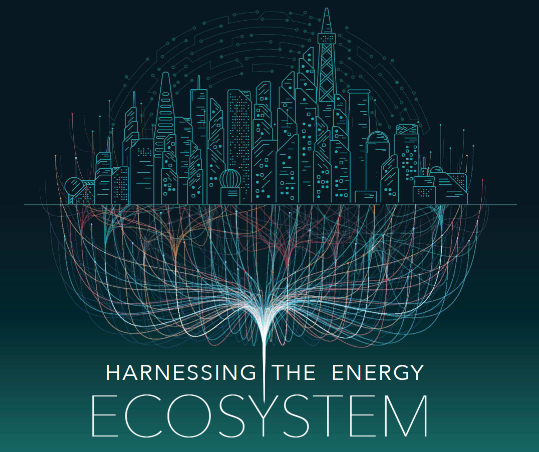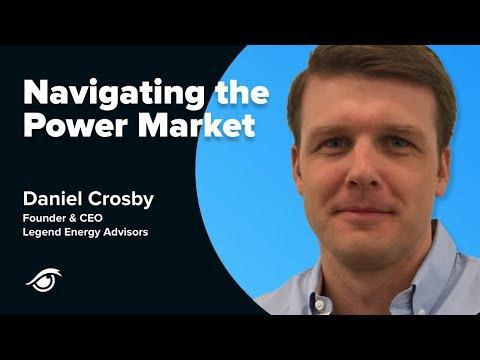Houston-based Legend Energy Advisors (Legend) is solving one of the prevailing challenges in the ESG space, which is obtaining, sorting, and utilizing accurate data to drive efficiency and lower emissions.
Legend provides its customers with carbon footprint tracking per product produced in real-time — something that few, if any, other companies have accomplished until now. Legend’s solution works in all kinds of applications. One example is the company’s partnership with Ready Seafood, one of the largest lobster producers in the world.
Ready Seafood is using Legend’s technology to track its carbon footprint per pound in real-time so it can provide sustainably harvested and processed lobster. Legend is also helping the company significantly increase its operational efficiencies. “A healthy lobster fishery relies on a healthy ecosystem,” said Wesley Smith, CEO of Ready Seafood. “Legend’s tools allow for our businesses to monitor their carbon footprint so we can do our part to keep the Gulf of Maine healthy for generations to come.”
When it comes to seafood, environmental stewardship starts with protecting marine ecology. However, there’s also the component of handling, packing, and distributing millions of pounds of lobster each year. “When processing at scale, timely information matters,” said Smith. “Whether it’s our water usage from a hose being left on unattended or our cooker running longer than required, the impacts can be large, measured by cost or environmental impact. Legend helps us respond quicker, lowering our cost and decreasing our carbon emissions.”
Uncovering Hidden Savings
One of the challenges of Legend’s business is that it can’t tell customers what the return on investment (ROI) will be up front. Legend can, however, estimate the benefits of certain solutions and accurate monitoring. Often, Legend finds that the ROI ends up being five-fold because its customers catch issues they never even knew existed. “So much of our platform starts with macro monitoring based strictly on what’s coming in,” said Dan Crosby, founder and CEO of Legend. “It’s a matter of stages. Once we get visibility in one area it often leads to more questions, directing us where to measure next. It’s all about starting big and working your way down the funnel.”
Given the abstract nature of Legend’s value proposition, it’s not surprising that the bulk of its initial customers, such as Ready Seafood, have been companies that truly want to make a difference and be leaders in the energy transition. In many ways, Legend’s customers have set aside their pride and been transparent and honest about where they are and where they want to be. The glaring issues of today’s ESG reporting include bloated figures, inaccurate data, and environmental targets relative to a particularly high emissions year. However, Legend finds that when it starts giving companies a higher level of granularity, they unlock ways to improve efficiencies they didn’t even know existed. “When Legend Analytics start showing customers what they didn’t know in an easy to view dashboard, they organically create improved processes,” said Crosby. “Our customers know their processes better than anyone else. Arming them with the tools they need to better understand their carbon footprint sets off a chain reaction of cost savings that otherwise wouldn’t have been possible.”
Building Legend Energy Advisors
“In 2014, I was living in New York with US$2000 to my name, an IKEA desk, and an LLC from Legal Zoom,” said Crosby. “And then I started Legend.”
Today, Legend is one of the leading providers of US-built hardware and software that gives companies real-time visibility into their process and equipment efficiency, labor intensity, and resource waste across operations. Simply put, the company helps businesses accurately track and organize their data, which leads to better energy management, cost savings, and a lower environmental footprint.
“My background is in construction and upstream oil and gas,” said Crosby. “I always wanted to build power plants and big infrastructure, but I lost everything at 30 years old in the crash of 2008. Starting over, I was working with a private equity company during the day and waiting tables at night. I got into energy through somebody I was waiting tables with. After three successful months, I got recruited by another company in the space. After 18 months, they moved me to the Northeast to build their national accounts group. I quickly grew frustrated with the lack of innovation. My passion was around industrial customers and big users because they’re the ones moving the power and gas markets. They’re the ones with the very large carbon footprint and they’re the ones with the biggest problems to solve on a power density level. I wanted to get behind the meter and help the customer understand how they can better manage their energy usage. This is where Legend’s mantra of ‘Don’t Just Use Better Energy, Use Energy Better’ got its genesis. The reality is that an overwhelming majority of the energy brokerage business is focused on making as much money as they can from the customer [often through hidden fees] without providing any value at reducing environmental impact. That’s when I realized if I was going to do this, I had to just do it on my own.”
The first few years were a slog. Most of Crosby’s free time was spent absorbing as much information as possible, such as where energy data came from, how different voltage levels, transformers, and energy infrastructures worked and impacted customers’ ability to get data quickly. Crosby learned that most company software was cobbled together with inherent security risks and significant data inaccuracy. In 2016, he decided that Legend would have to build its own software in-house. At this point, he had taken on a seed round of investors to hire developers and build the platform. “I found myself in mines, chicken plants, sewer plants, and all these incredible places to be on really hot Saturday afternoons, learning how everything worked,” laughed Crosby. “From inputs and outputs on the programmable logic controller of customer equipment all the way up to dispatching power plants and nominating gas pipelines. Everything must be understood across the entire energy supply chain if you’re truly going to design an energy ecosystem to help customers drive the energy transition.”
Data At Work
Crosby’s self-reliant mentality has been baked into the culture of Legend. Legend employees often have to wear multiple hats when dealing with several points of contact from a single customer. From finance, to legal, to engineering, to procurement, one of Legend’s differentiating factors is that it provides a suite of solutions for the customer instead of just selling them software and then letting them figure out how to use it. “What makes us unique is that we’re connecting multiple interdependent pieces together,” said Rob Newton, vice president and national sales director at Legend. “Most organizations operate in simultaneous silos, so teams end up not knowing what is going on from an energy perspective across the organization. The reality is that the customer needs a comprehensive solution. When companies hire a partner to help them with their energy data, they tend to get a disorganized solution which they must manage. Usually, the process of collecting data is left to the customer. Most software solutions require the customer to gather the data to the platform, while the software provider supplies the front end and analytics. Legend is different because it provides a completely holistic solution with integrated parts from data gathering to analytics with alerts and alarms. This radically increases data fidelity and allows customers to run their business better and actively drive down their carbon footprint, which is where the customer wins. You’re not only giving them a better solution, but it’s also taking less of their time and internal resources to accomplish their goals. This allows internal personnel to focus their time and efforts in areas where they are the resident expert.”
Legend’s culture has allowed it to serve a wide variety of customers. Legend helped a major US container terminal significantly reduce its energy waste and light pollution. The company is now implementing one of the largest solar projects at a US port. These changes are making a significant impact on the customer’s ESG objectives by tracking carbon footprint data in the Legend Analytics platform every five minutes.
In New York City, Legend was hired by a property management company to reduce costs and lower the environmental footprint of one of the city’s tallest skyscrapers. Legend helped dramatically reduce the base building and lighting load and then installed more than 100 submeters to give every tenant access to their real-time carbon footprint on the Legend Analytics platform. The service empowers tenants to compare their energy usage to overall occupancy and operations to drive down the environmental intensity in their specific tenant space. All told, Legend reduced the client’s capacity obligation by more than 30%. This capacity number (defined as the building’s highest peak during the prior year, and the amount of electricity the grid is prepared to deliver at any moment) typically makes up approximately 20% of a consumer’s total electric cost. It also helps the grid during peak times and drives less need for new power plants. Legend then negotiated a better electricity contract for the client. In total, the new procurement strategy saved the customer more than US$1 million last year. Legend experts meet with the customer every month to explore further options.
From oil and gas production, to mining, to heavy manufacturing, Legend’s ability to serve a wide swath of customers across different geographies and in different industries is a product of its brand-agnostic approach to data management. Building Legend’s offering from the ground up took a great deal of time, effort, and lean years. Ultimately, Legend believes it was all worth it for its business and customers. The more data Legend can work with, the better its software becomes and the more the company can hone its craft. “When you’re truly trying to get your arms around energy, drive the bottom line, and lower your environmental footprint, efficiency becomes paramount,” said Crosby. “At their core, customers are often simply an ecosystem of either a single plant or multiple plants that are working together to create a product. There’s a lot of similarities there, even across different industries. Each customer has an environmental impact that scales up to that corporate environmental impact. If you keep scaling that up, you get your arms around the global energy challenge. It’s a challenge for everyone, from major corporations down to the residential customer. As more customers obtain verifiable high-fidelity energy and environmental data in real time and share it across the supply chain, the closer the energy transition becomes a reality. The Legend Analytics ecosystem is changing the way companies execute energy procurement and manage their market risk. On a macro level, it allows us to do things like implement electric vehicles on a large scale. It also helps tackle the energy challenges associated with hyper scalers and massive data centers that can consume as much energy as a medium-sized city in a single building. Artificial intelligence [AI] is going to consume far more power than anybody really understands. A lot of people are focused on energy supply, buying renewable energy certificates, etc., but power density is the true challenge. We need to use energy better, especially when you consider the magnitude of power required to drive our phones and AI.”
Leveraging LEAdge
Between 2014 and 2021, Legend was focused on building out its software solution, hiring talent, expanding its consulting services, manufacturing panels from the ground up, and providing a cohesive energy ecosystem across all industry verticals. Over the last 18 months, Legend’s priority has shifted to developing a new hardware solution, the LEAdge, as well as laying the groundwork for a capital raise to take the company to the next level. The LEAdge puts real time environmental data in the hands of customers quickly and cost effectively across their entire organization.
The LEAdge will replace Legend’s current sensor panel offering and provide a smaller, more scalable solution for Legend’s clients. “This new device can literally talk to anything that can give a signal,” said Crosby. “Anything on site, power and gas meters, production equipment, pressure sensors, can all talk to our device. We take that data and move it through a completely encrypted process to the cloud. We are providing the customer with a front-end user interface, dashboards, alerts, alarms, automated reporting, text message callouts, the whole nine yards. We are automating sustainability metrics by delivering emissions reporting to our customers every five minutes with 100% high-fidelity data.”
Companies across all sectors of the economy are realizing the value of producing accurate ESG reports. Investing in actionable sustainability benefits all stakeholders, including shareholders, employees, customers, and communities. The LEAdge enhances Legend’s ability to help customers harness data faster, translating to timely decision making and measurable results. “In this day and age, everyone, especially industrial energy users, are concerned with security,” said Crosby. “We control the hardware all the way down to the component level. It’s a big advantage to be able to tell our customers that we control the entire stack, from manufacturing the circuit board, all the way up to the cloud. When working in tough industrial environments, companies must understand how to install data collection so it’s not getting damaged or destroyed and can successfully survive extreme hot or cold temperatures. We’ve been through all that. We had hundreds of thousands of dollars of our equipment destroyed in the early stages solving these challenges. We’ve learned the hard way, but it was worth it to get Legend to where we are today.”
Addressing Security Concerns
A big focus of Legend’s existing panel technology, as well as the LEAdge, is encryption. Many industrial companies end up trying to build their own data-management software in-house because they know their assets better than anyone else. However, poor execution often leads to a system with plenty of holes that can be easily exploited during a data breach.
One of Legend’s biggest challenges is earning customer trust. It’s a big ask for a firm to trust an outside company to install hardware on its assets and give away the keys to its data. That is why Legend has invested so heavily in encryption and security. Legend’s CTO, Mark Graham, designed the data merger of PayPal and eBay and specializes in high-velocity data gathering with end-to-end encryption so customers can operate on hard-wired or even wireless networks. “I built out an entire datacenter for eBay and PayPal called Stratus, which was a cloud template that was supposed to be eBay’s foray into the cloud world,” said Graham.
“Graham was also the database team lead for Talisman Energy, so he knows a thing or two about the energy industry,” said Crosby. “Mark was on the global SAP database team for Hewlett Packard. He also served as the global database team lead for BMW Group and was responsible for all BMW databases in the world. We are very thankful for Mark’s experiences across different industries and geographies, which have provided him the skillset needed to build Legend’s technology stack safely and securely.”
Legend can use all major telecom providers and never be exposed to the public internet. “The sheer volume of nefarious hackers out there would shock the general public,” said Graham. “Even in the United States, hackers are perpetually pounding on everything. A lot of customer ransomware attacks gain access through emails. As the infrastructure gets more and more digitalized, you’re going to see infrastructure become completely locked up.”
The Path Forward
Even as Legend has expanded the depth and breadth of its offering, Crosby has been careful to keep the company structured so it can grow at a sustained exponential rate. As is common with capital raises, a company will try and throw investment dollars at various projects and hope they stick. Legend is doing the opposite. It is laying the groundwork for tens of millions of dollars in funding and detailing the precise way those investment dollars would be used without jeopardizing the efficiency of the company. Although Crosby is open to funding, he doesn’t want to sell the company to a firm because that would limit the societal impact Legend can make. By keeping the company independent, Legend can help companies across all sectors of the economy lower their energy use. “We are looking for customers who truly desire to be leaders in their field by being financially and environmentally sustainable,” said Crosby. “This will drive them to become industry leaders. That’s our core customer base. Everyone else will have to catch up eventually, whether they want to or not. There are ongoing conversations with regulators because investors are making ESG-related decisions. A large percentage of these claims are based on estimates and inaccurate numbers. The reality is whether you’re trying to save the environment or save money, you can accomplish both goals through efficiency improvements. Companies that leverage actionable energy and operational data in real-time improve their bottom line and their environmental footprint. These are the leaders of the energy transition, and we are excited to empower them to shape the future.”





